During the summer vacation, the 13th ‘Belt and Road’ National College Student Textile Xinjiang Aid Mission from Donghua University traveled to six prefectures in Xinjiang for a 10-day social practice. Aligned with the Party's governance strategy for Xinjiang in the new era, this group focused on addressing pain points in the development of Xinjiang's cotton and textile-apparel industries which is the key sectors within the region's ‘Ten Major Industrial Clusters.’ The team visited 17 enterprises, conducted over 10 textile workshops, provided technical training to more than 500 textile industry employees, and established two university student social practice bases. They explored a trilateral social practice model integrating ‘technology empowerment, cultural nurturing in Xinjiang, and ideological fortification through revolutionary spirit’,injecting youthful energy into Xinjiang's textile industry development and making positive contributions to strengthening the sense of community for the Chinese nation.
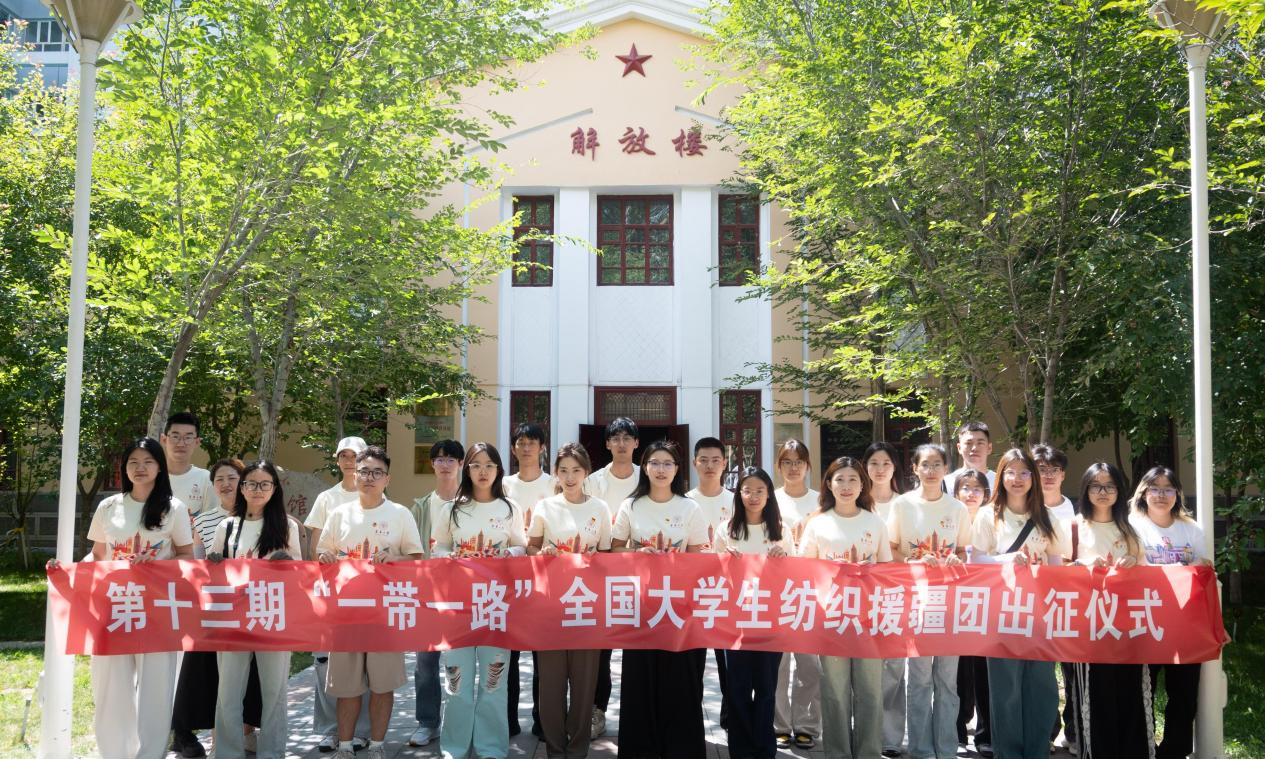
(The 13th Xinjiang Aid Mission holds departure ceremony at Xinjiang University's history museum)
Prosperity for the People, Development for Xinjiang: Textile Workshops Address Industry Pain Points in Xinjiang
For years, the Xinjiang Aid Mission has actively implemented the strategic deployment of counterpart assistance to Xinjiang. Under the guidance of Professor Qiu Yiping, who is the Shanghai Model Educator, it has fully leveraged the distinctive strengths of its world-class textile discipline, proactively introduced advanced industry technologies, and contributed to the transformation and development of Xinjiang's textile and apparel industry. The university Party committee has placed high importance on the development of the Xinjiang Aid Mission. In July 2021, Party Secretary Liu Chenggong led a delegation to Alar City to attend the 10th anniversary celebration of the aid mission. In July 2025, he visited Korla City to extend warm regards to representatives of the 13th Xinjiang Aid Mission and attended a symposium.
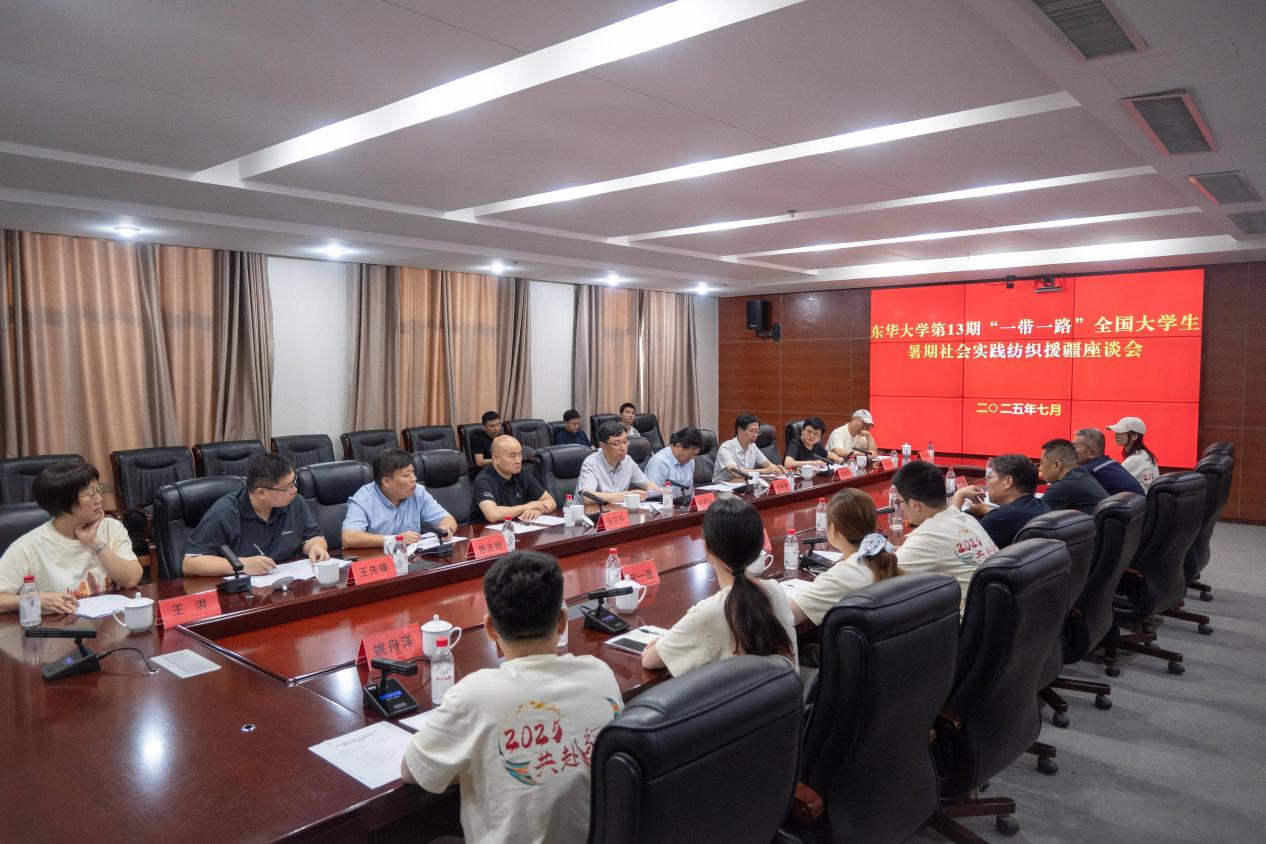
(At the symposium)
To support Xinjiang's textile industry in achieving high-end advancement, intelligent transformation, and green development, the Xinjiang Aid Mission has sustained its textile workshop initiative for 13 consecutive years. Mission members conducted in-depth field research at textile enterprises, examining pain points including medical materials, raw textiles, printing and dyeing, and garment manufacturing across the supply chain to deliver a comprehensive ‘deep-dive assessment’ of the sector. At Korla Huitongtai Dyeing Technology Co., Ltd., the team explored solutions integrating dyeing techniques with apparel design based on the company's intelligent dye formulation system, opening new avenues for cross-industry applications of textile art. At Xinjiang Zhibo Garments Technology Co., Ltd., participants studied key technologies for biological degumming of ramie fiber and intelligent production lines, gaining insights into ramie's ecological value and industrial applications. At Xinjiang Deli Home Textile Printing & Dyeing Technology Co., Ltd., the group actively explored techniques to enhance the density of home textile fabrics, providing technical references for the development of functional home textiles... Through these textile workshops, the Xinjiang Aid Mission engaged in dialogue with enterprises about their development needs and industry pain points, compiling a list of issues for social practice.
Based on in-depth research, the faculty and students of the Xinjiang Aid Mission conducted thorough discussions on four key bottleneck technological challenges: the application of waterless dyeing technology and industrial chain coordination in the textile industry of Yining County, Xinjiang, under water resource constraints; breaking through key technologies for efficient extraction of functional components from lavender and its textile application, to build an innovative high-value-added entire industrial chain system for lavender textiles in the Ili region of Xinjiang; research on intelligent upgrading paths for the textile industry which means collaborative innovation through equipment transformation, automation optimization, and talent recruitment; and technological on lightweight roller technology for spunlace nonwoven fabrics; and research and development of high-strength elastic composite materials and optimization of intelligent carding processes. These efforts have helped enterprises clarify existing problems and explore technological breakthroughs and project cooperation.
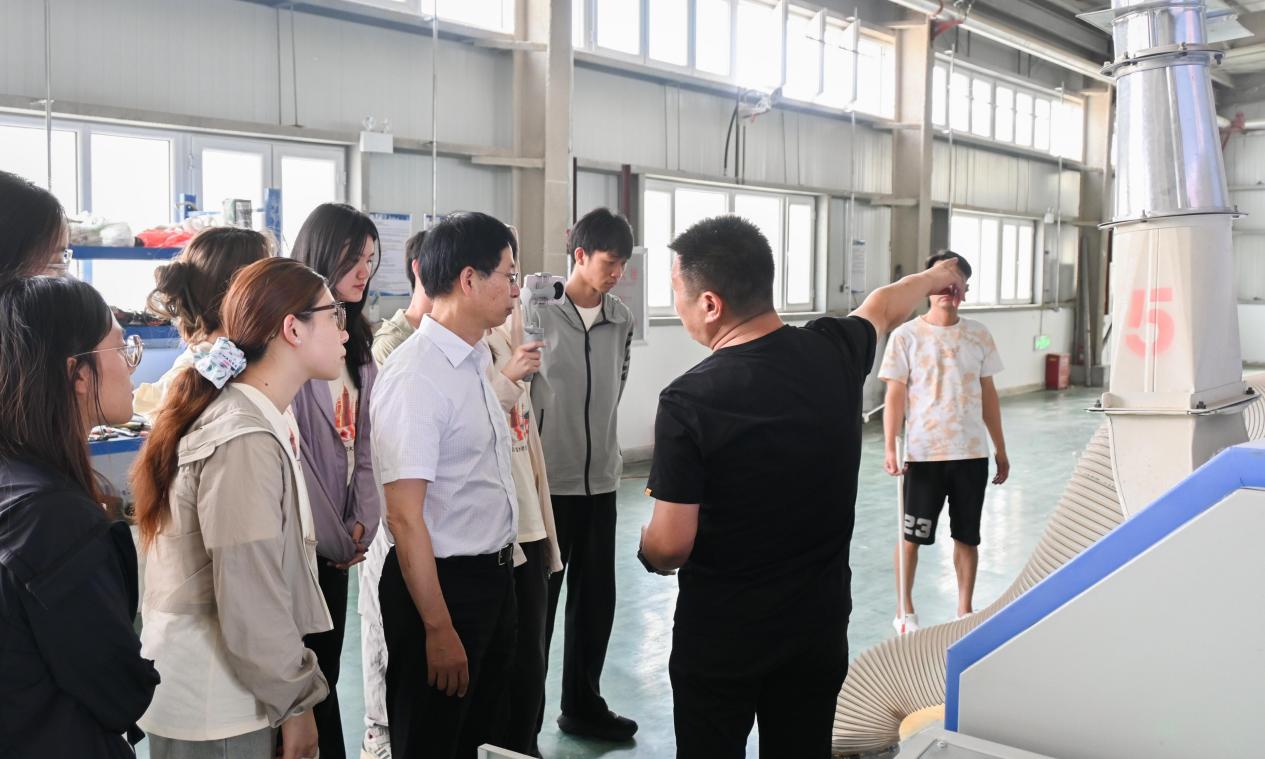
(Members of the Xinjiang Aid Mission were conducting research at an enterprise)
Based on the list of social practice issues, faculty and students from the Xinjiang Aid Mission developed 12 innovative workshop courses by precisely addressing the practical needs of textile enterprises in their production processes, utilizing data from research interviews. Covering topics such as ‘Frontiers in Textile Technology for Sustainable Development,’ ‘Advancements and Technological Breakthroughs in Fiber Materials,’ ‘Innovative Eco-Friendly Color-Spun Technology,’ and ‘Spinning Process Optimization: Efficiency, Quality, and Sustainability Breakthroughs,’ these courses deliver cutting-edge textile knowledge to enterprise employees, empowering their professional growth and supporting talent development within textile enterprises.
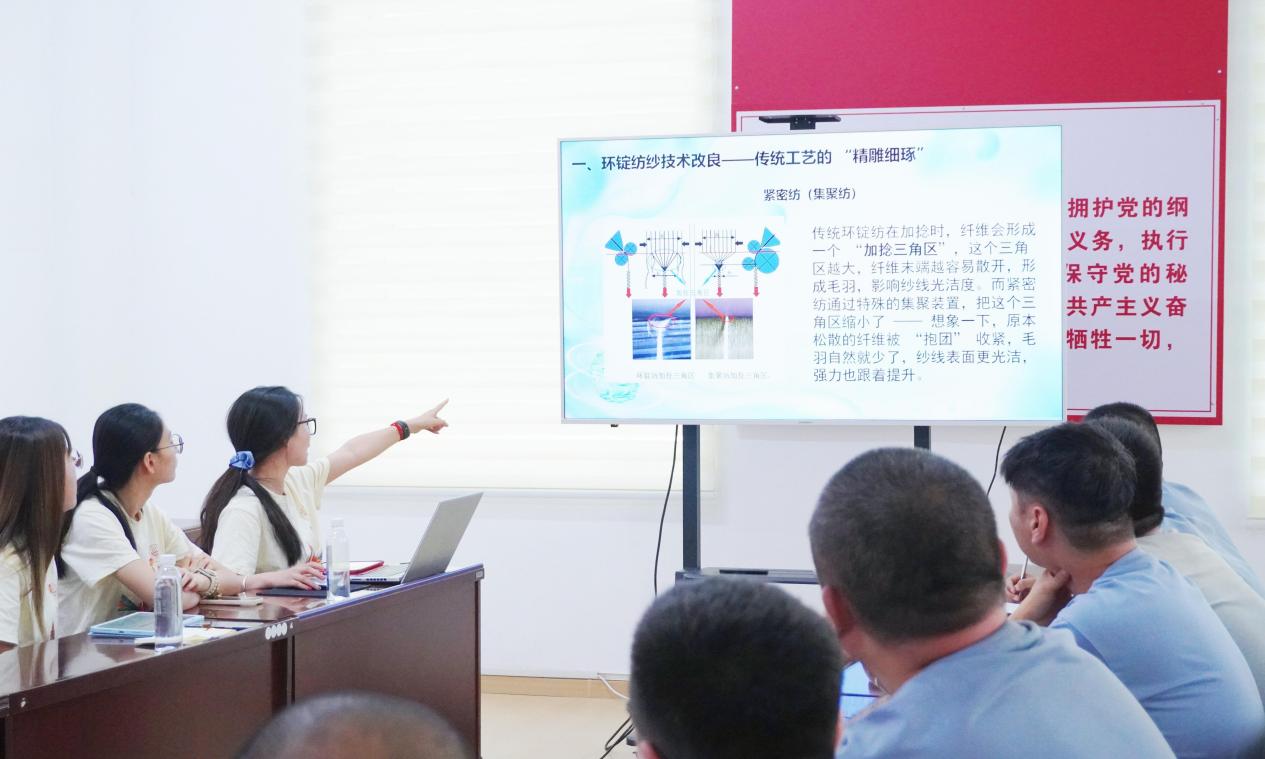
(Members of the Xinjiang Aid Mission were delivering lectures at enterprises)
Cultural Enrichment in Xinjiang: ‘Promoting Mandarin to Boost Rural Revitalization' Volunteer Service Revitalizes Intangible Cultural Heritage
In 2025, the Xinjiang Aid Mission was approved for the national summer volunteer service project ‘Promoting Mandarin to Boost Rural Revitalization’ by the Department of Language Application and Administration of the Ministry of Education and the Department of Youth Development of Central Committee of the Communist Youth League of China. To actively explore the establishment of a long-term mechanism for promoting the national common language and script and fostering a sense of community for the Chinese nation, the university established a Mandarin promotion social practice base at the Yining County Science and Technology Bureau with the help of the Xinjiang Aid Mission. Vice President Chen Ge attended the unveiling ceremony. Moving forward, the Xinjiang Aid Mission will leverage its strengths in textile and apparel culture and academic disciplines to help establish a ‘language + culture + technology’ promotion model. Through textile workshops, it will explore ‘Business Mandarin + Textile Skills’ training courses and pioneer a ‘faculty + graduate teaching assistants’ digital teaching paradigm, ensuring the ‘Promoting Mandarin to Boost Rural Revitalization’ volunteer initiative takes root and flourishes.
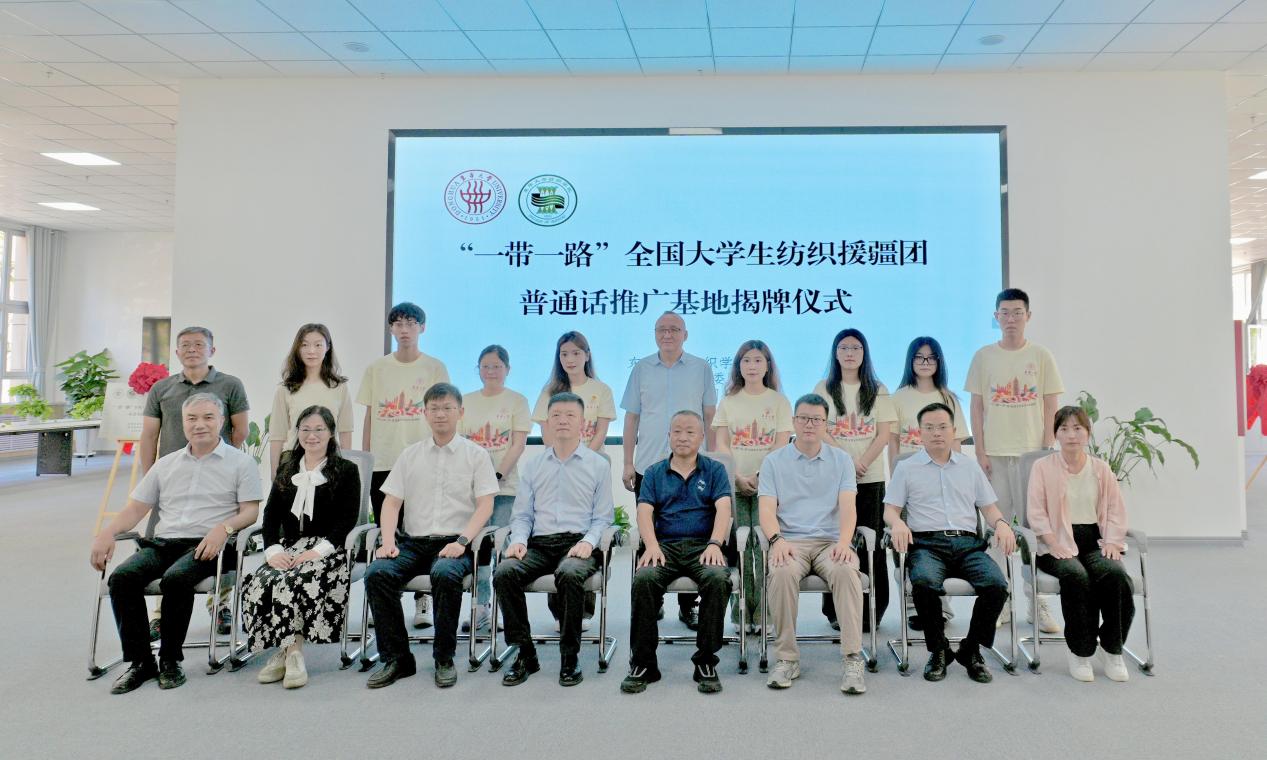
(At the unveiling ceremony)
With support from the Nantong City Work Group for Supporting Yining County, and the Yining County Communist Youth League Committee, the Yining branch of the Xinjiang Aid Mission launched a volunteer service initiative themed ‘Dual-Track Promotion of Science and Mandarin, Red Language Resonance.’ Members visited caring community to host the ‘Exploring the Wonders of Fibers’ exhibition and exchange. Through specialized courses like ‘Unraveling the Mysteries of Basalt Fibers,’ ‘Decoding Smart Interactions and Wearable Textiles,’ ‘Hand-Dyed Tie-Dye Challenge,’ and ‘Experiencing Botanical Block Printing Techniques,’ members introduced border region children to Mandarin learning and textile science exploration. “When Uyghur children described tie-dye techniques in fluent Mandarin, and when Kazakh youths excitedly discussed technological applications, we witnessed the most beautiful picture of ethnic interaction, exchange, and integration” recalled Song Yihan, leader of the Xinjiang aid team.
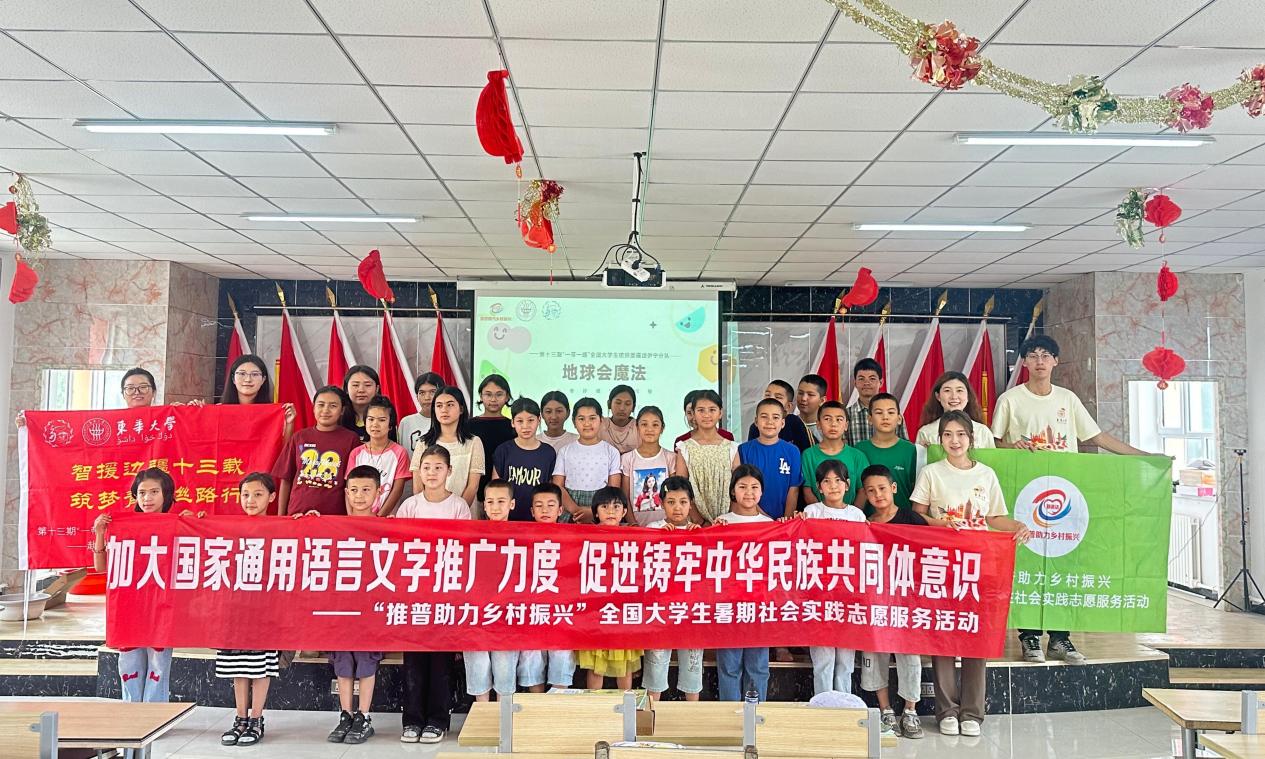
(volunteer service activities by the Xinjiang Aid Mission)
Long-Term Frontier Development: The Corps Spirit Ignites the Spark of Youth in Defending the Nation and Guarding the Borders in the New Era
In May this year, General Secretary Xi Jinping replied to a letter from members of the Western Volunteer Program Service Team at Xieyite Primary School, encouraging young people in the new era to “go where the motherland and the people need them most.” Faculty and students from the Xinjiang Aid Mission conducted a special study session on the spirit of this important letter and visited the 359th Brigade Reclamation Memorial Hall to participate in red education on defending the country and guarding the borders in the new era.
Following the guide, the students and teachers of the aid mission embarked on a walking classroom. Rusted hoes and yellowed military reclamation diaries prompted the team members to pause and reflect; countless sculptures and photographs vividly recreated the moving stories of Shanghai educated youth supporting Xinjiang's development in the 1960s. The delegation gained profound insight that the spirit of the Xinjiang Production and Construction Corps is not only a historical monument but also a spiritual torch inspiring the youth of the new era to carry forward the struggle. By tracing the footsteps of the military reclamation pioneers and continuing the chapter of Xinjiang aid, they are actively contributing to the cause of defending the nation and guarding its borders in the new era. The Belt and Road National College Student Xinjiang Aid Social Practice Project will continue to ignite the youthful spark of long-term Xinjiang development.
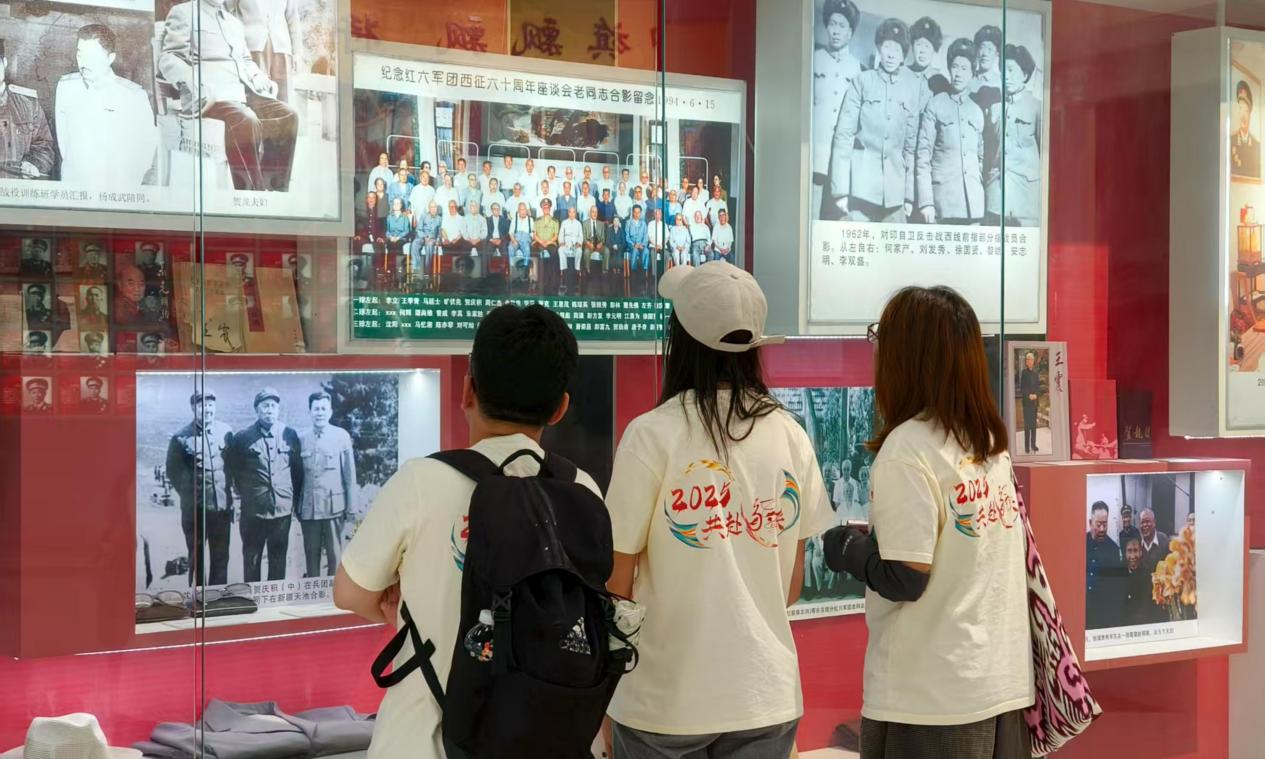
(members of the Xinjiang Aid Mission were visiting the Military Reclamation History Museum of the 359th Brigade)
It is reported that the Belt and Road National College Student Textile Aid Xinjiang Mission was established in 2011.The Xinjiang Aid Delegation aims to actively respond to the national Belt and Road Initiative, implement the new-era strategy for governing Xinjiang, and steadily advance the ‘Twin-City Aid for Xinjiang’ program, thereby forging a strong sense of community for the Chinese nation through concrete actions. Over the past 13 years, the team has traveled across five autonomous prefectures and 13 regions (cities) in Xinjiang, visiting nearly 500 enterprises, training over 20,000 employees, and completing research reports totaling more than 900,000 words. The 13th aid mission organized 15 specialized textile workshops covering technical training and textile science outreach, benefiting over 500 enterprise employees and youth. They produced 100,000 words of in-depth research reports and actively engaged in social services such as promoting the national common language and conducting industrial surveys. Their efforts garnered coverage from multiple institutions and media outlets, including Shanghai Municipality, Xinjiang's Ili Kazakh Autonomous Prefecture, and Bayingolin Mongol Autonomous Prefecture. In the future, with the establishment of Donghua University's Xinjiang Textile Industry Research Institute, the practice initiatives of the Xinjiang Aid Mission to support the development of Xinjiang's cotton, textile, and apparel industries will continue to expand. The University Youth League Committee and the College of Textiles will organize more Donghua students to join the new-era Xinjiang Aid Mission, working together to weave bonds of ethnic unity and write a new chapter in Donghua University's Xinjiang aid endeavors through technological innovation!
